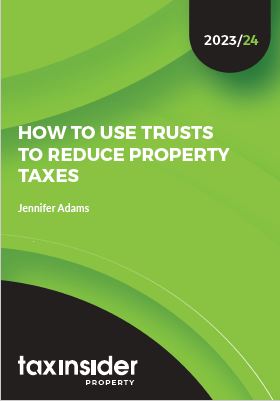
------------------------
This article discusses the topic of trusts. For more in depth discussion on this important area of property taxation, please see our recently updated report ‘How to Use Trusts to Reduce Property Taxes’. Save 40% Today.
------------------------
The family home is the most valuable asset in the estates of many individuals. Several inheritance tax (IHT) planning arrangements involving the family home have been challenged by HM Revenue and Customs (HMRC) or blocked by anti-avoidance legislation over the years.
The ‘double trust’ scheme (sometimes called the ‘IOU’ or ‘home loan’ scheme) is the latest family home IHT planning arrangement to be defeated by HMRC, following a First-tier Tribunal (FTT) case.
What is it?
Double trust schemes were particularly popular in the 1990s and early 2000s. The scheme typically involved the homeowner (e.g., Mr A) selling his residence to Trust 1 (i.e., a life interest trust for him) for full market value. The trustees would give Mr A an IOU for the purchase price. Mr A would gift the IOU to Trust 2 (i.e., a life interest trust for (say) his adult children). Mr A would continue occupying the house by reason of his life interest under Trust 1.
The intended IHT consequences were that: (a) on Mr A’s death, his life interest trust fund (Trust 1) formed part of his estate; but (b) the value of the property would be largely or wholly covered by the IOU to the trustees; and (c) the transfer of the debt to Trust 2 was a potentially exempt transfer, so that on Mr A’s survival for seven years, the gift was not charged to IHT.
HMRC says ‘no’!
HMRC has sought to challenge double trust schemes on various grounds (see HMRC’s Inheritance Tax manual at IHTM44103-IHTM44106). However, it took many years for the first case to be decided by the FTT on the IHT treatment of such schemes.
In Pride v Revenue and Customs [2023] UKFTT 316 (TC), the deceased (GJP) died on 31 October 2016. He was the principal beneficiary of Trust 1 (the property trust) established in October 2002. The property trust’s assets included investment bonds (acquired in 2002 for £800,000 from sale proceeds of GJP’s house). The property trust was also effectively the debtor under loan notes held by Trust 2 (the children’s trust) created in November 2002).
An issue arose about whether (under anti-avoidance rules in FA 1986, s 103 or IHTA 1984, s 175A) the value of the loan notes (as a liability of the property trust) should be disallowed in determining the value of GJP’s estate. Another issue was whether (under the ‘gifts with reservation’ (GWR) rules in FA 1986, s 102) the loan notes (as assets) formed part of GJP’s estate.
The FTT concluded (among other things) that the anti-avoidance provision in FA 1986, s 103 applied. Thus, in determining the value of GJP’s estate, the loan note liability fell to be abated completely. Alternatively, the FTT held that another anti-avoidance provision (IHTA 1984, s 175A) would apply to the same substantive effect. Furthermore, FTT concluded that although the GWR anti-avoidance rules did not apply, the property trust assets were already treated as though GJP was beneficially entitled.
Following Pride, the taxpayer suffered another defeat in a case concerning a double trust scheme (The Executors of Elborne & Ors v Revenue and Customs [2023] UKFTT 626 (TC)).
Practical tip
There are variants of the double trust scheme, and it remains to be seen whether the appellant in Pride will appeal. However, HMRC is determined to consign double trust schemes to the dustbin of failed IHT planning. Individuals with existing double trust schemes should consider obtaining expert professional advice.



